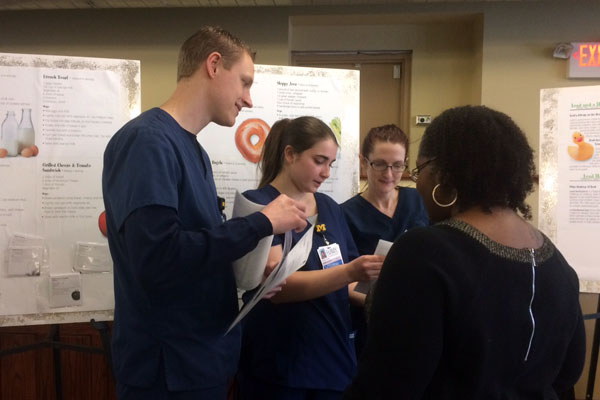UM-Flint Nursing Assists County Health Department with Lead Screenings

Within the next several weeks, there are more than ten Genesee County Health Department lead screening and education events planned throughout the community. University of Michigan-Flint nursing students, faculty, or both will be at all of them contributing their time and talents.
The department, along with faculty and students from the Department of Public Health and Health Sciences (PHHS) and several others within the university, have been helping out with the clinics, and other efforts, since the county started the program last fall.
"It's really been invaluable," Kim VanSlyke-Smith, a nurse practitioner at the county health department and a nursing lecturer at UM-Flint, said about the university's contributions to the events.
"We have the students and we have access to the students because we already have many of them with course-related assignments working in the community," she said.
Several others within the UM-Flint School of Health Professions and Studies are helping out as well by providing health education materials at the events under the direction of several faculty from the department of PHHS, VanSlyke-Smith said.
Most community-based lead screening, depending on the size and need, have drawn between six to 18 UM-Flint volunteers, including faculty and students, she said.
Qualified undergraduate and graduate level nursing students have assisted with the actual screenings for children, and others have helped out by providing lead education materials to parents.
Margaret Andrews, director and professor of nursing at UM-Flint, said the students are learning crisis management, clinical problem-solving, planning, and technical skills, and also gaining a larger grasp of the important contributions of nurses to meeting human needs of people in the midst of a crisis.
"The most important benefit is learning that professional nurses are counted on by society to use their knowledge and skills to benefit those who are vulnerable and at high risk for disease, injury, and in the case of lead poisoning among children under two years of age, a lifetime of developmental disability," Andrews said.
Throughout the crisis, nursing students have contributed in different ways, VanSlyke-Smith said. Some helped out with a call center at the county health department in early October.
"They contacted hundreds of families in the affected zip codes who had received prior services (at the health department) to inform them of the filter distribution on October 3," VanSlyke-Smith said, about the filter handout that included volunteers from across the entire university community.
Nursing students also helped with the development of educational materials for families about lead, VanSlyke Smith said, such as nutrition and hand-washing.
The student and faculty involvement has helped "ease the strain of the health department," she said.
The department of nursing also recently appointed Veronica Robinson, a nursing faculty member, as the department liaison to the county health department, Andrews said. She will help match services from UM-Flint nursing and affiliate groups to the needs of the health department.
Amanda Richardson, a traditional nursing student at UM-Flint, has helped out at multiple events so far, explaining information to families and helping to alleviate their stress.
"I think it's important, for myself, as an individual, being there. I would want this for myself and my family, if I was in that situation," Richardson said.
Richardson said the university's focus on community engagement helps improve students as nurses.
"I think the university does a lot with the community," she said. "They really try to get us as much involved with the community as possible."
Related Posts
No related photos.
- Career Development
- College of Health Sciences
- Community
- Faculty
- Graduate Programs
- Nursing
- Public Health & Health Sciences
- University News
UM-Flint News
The Office of Marketing & Communications can be reached at [email protected].